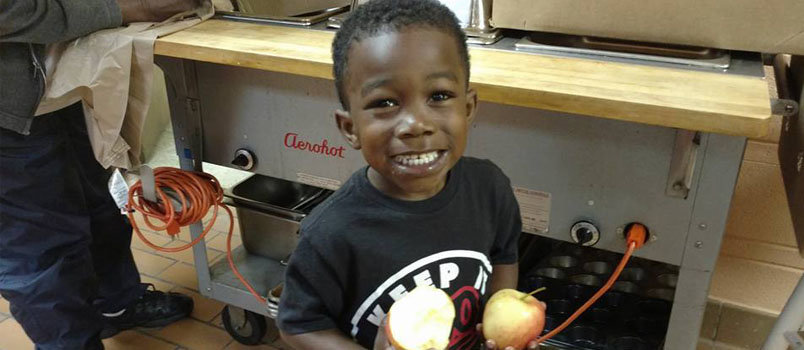 Young children are among those served through the ministry of Calvary Baptist Church. DWAYNE CARTER/Special
Young children are among those served through the ministry of Calvary Baptist Church. DWAYNE CARTER/SpecialAUGUSTA — First it was Upton’s Department Store in 1993. Then Belk’s in 1996 followed by J.B. White and Piccadilly Cafeteria in 1998. One by one the anchor stores and more popular restaurants moved out of Augusta's Regency Mall, the city’s first premier shopping destination.
The Mall was the area’s economic engine, one of the largest in the state with 800,000 square feet of retail Nirvana. But its popularity was short lived due to the changing neighborhood and the opening of the newer, flashier, Augusta Mall where shoppers felt more safe.
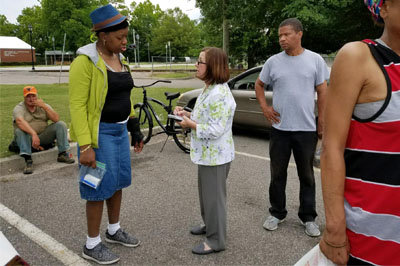 Carol Brown documents the needs of a homeless woman at the Street Ministry in downtown Augusta. DWAYNE CARTER/Special
Carol Brown documents the needs of a homeless woman at the Street Ministry in downtown Augusta. DWAYNE CARTER/SpecialEventually gangs appeared in the neighborhood, followed by a kidnapping at the Mall. By then the handwriting was on the wall and residents began to flee to sell before their houses depreciated further.
One by one the stores fled, and its fate was sealed with the bankruptcy of Montgomery Ward in 2001. Calvary Baptist Church, which sat across the street, was both a witness and victim of the collapse.
Former Augusta Commissioner Bill Locket summed it all up in 2016 when he stated, “Regency Mall is an eyesore. It has stymied the growth in my community for years. All we can get now in that area are title pawns, Family Dollars and liquor stores. And when you go to a city, you know when you see the title pawns, the Family Dollars and the liquor stores, you are in the poor part of town.”
As the area declined and people moved away to escape the change that was taking place, Calvary also declined from a large congregation to a much smaller one. The church has stabilized, though some still move away from the area each year.
While the church wasn't moving to greener pastures, the thought was clearly under consideration. Today the congregation has rebounded to about 112 active members ... a church forever changed from its glory days ... but remains determined to serve its new neighbors.
No one knew that the death of a Mall and its community would be the birth of a ministry.
Amid all that turmoil is when Carol Brown stepped up to the plate and answered the call to help those who needed it most, even if the church would be taken advantage of on occasion. It did not seem just or fair to penalize the many because of the actions of the few who “gamed” the system, she says.
Brown has seen the neighborhood rise and decline since she was baptized at the church at age 16. Today, at 70, she is living out what she has been taught across the past 54 years about biblical truths.
She remembers the building of the Mall across the street from the church and how it brought prosperity and visibility to the neighborhood and the church … and the decline that occurred with its closing.
“I remember those early days of decline when people, down on their luck, began showing up at the church office. Even though I was working fulltime at the Veteran’s Hospital I still had a heart for them,” she says in retrospect.
Brown began making brown bags for the needy and leaving them with the church receptionist. It wasn’t much … a few canned goods that did not need heating, some Pop Tarts and crackers to get the needy through just a couple more days.
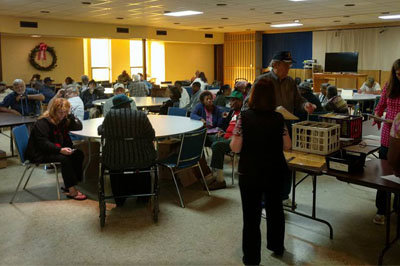 On Tuesday mornings both the less fortunate and the homeless gather in the fellowship hall at Calvary Baptist to receive food, clothing, and monthly assistance from Well Care. DWAYNE CARTER/Sppecial
On Tuesday mornings both the less fortunate and the homeless gather in the fellowship hall at Calvary Baptist to receive food, clothing, and monthly assistance from Well Care. DWAYNE CARTER/SppecialA rare early retirement incentive from the Veteran’s Hospital – though she was not ready to retire at age 47– gave her the time to expand the ministry. She and another member, Margaret Wehn, launched what became the CARE Ministry – Caring Arms Reaching Everyone.
The two women used an empty room at the church and accumulated non-perishable food items and expanded it to clothing in any size they could locate.
Today, individuals begin lining up outside the church at 7 a.m. each Tuesday to be first in line when the CARE Ministry opens its doors two hours later. At exactly 9 a.m. the ministry opens with prayer and a devotional and all new guest have a counseling session where they receive the full plan of salvation and a Bible if they do not have one.
Hundreds have prayed to receive Christ through the years.
About 70 families consisting of more than 300 individuals receive food and clothing each week. In summer when schools are not in session the demand increases because of families without adequate food for their children.
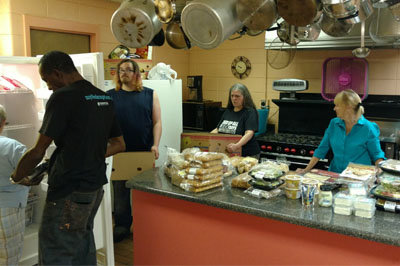 Sherry McCellen, left, and Pat Eisenhardt, right, serve in the food line at the downtown ministry to the homeless. DWAYNE CARTER/Special
Sherry McCellen, left, and Pat Eisenhardt, right, serve in the food line at the downtown ministry to the homeless. DWAYNE CARTER/SpecialIn May alone, 996 individuals were served through the ministry.
But Brown did not stop there. A second outreach known as the Street Ministry in downtown Augusta was launched out of the Salvation Army building and ministers to about 40 homeless each week. Food, clothing, bibles and personal hygiene products are freely given to those in need each Sunday from 9:30 until 10:30 a.m.
The most frequently requested items are tennis shoes and backpacks, underwear and socks. Cookware, baby items, books, furniture, and other household items are also provided.
Both ministries have such high standing in the community that BI-LO Grocery Stores donate up to 4,000 pounds of food monthly.
All clothing is donated from groups throughout Augusta, as well as local businesses. Well Care serves the CARE Ministry once a month to help the needy with health care plans and consult with those who may be eligible for Medicare.
Two individuals are grateful for the ministry.
One man who goes by the name of Truck, said, “This church has been a great big huge blessing to me and my wife. We both try to work some, but we are not able to work full time because of health problems. Sometimes we only have enough food for the week because of y’all.”
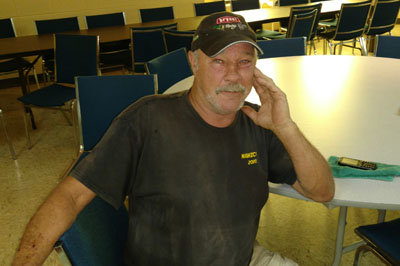 Truck, one of the individuals helped through the CARE Ministry, says he and his wife are dependent on the generosity of others. DWAYNE CARTER/Special
Truck, one of the individuals helped through the CARE Ministry, says he and his wife are dependent on the generosity of others. DWAYNE CARTER/SpecialAnother man, known as Johnny, explains that he doesn’t have much use of his legs and lives on disability. “I’ve been coming here for years for help and everyone has always welcomed me and done me good. I can’t drive and I need another surgery on my leg.
“I can only go where my wheelchair takes me, so being able to come here for help means a lot to me. I am very thankful for this church and especially Mr. & Mrs. Brown.”
Up to 25 of Calvary’s members donate their time to support the ministry and keep it operating under a razor thin budget. In fact, Pastor Dwayne Carter says the ministry operates entirely on donations and is not included in the church budget.
Carter, who accepted the challenge to pastor the church in 2010, admits that a compassion ministries like those at Calvary are a fine line to walk. Not all church members want to help the needy, citing the biblical admonition that if an individual does not work, he should not eat. On the other hand, advocates cite verses which establish God’s heart for the poor, which “you will have with you always.”
“It’s a difficult situation because people try to interpret scripture so many different ways. We are aware of those who attempt to take advantage of us and we try to eliminate such abuse, but we have to accept that we will not be 100 percent successful.
“Yes, we have found canned goods thrown in the bushes because the individual did not like what they were provided. Those are canned goods that were taken from others who were genuinely needy and would have been grateful for anything to get them through one more day.
“But is it the right thing to deny the poorest of the poor another day’s food or clothing because someone else abused the system? That is the question that every person will have to answer to God for,” he says.
“What I can tell you is that we make it clear that we are concerned about the spiritual needs of every person who darkens our door and we share the gospel with them. We do not make a profession of faith the litmus test for receiving food or clothing or medical assistance.”
Brown agrees and sees both sides of the equation and comes down on the side of Christ’s many admonitions to help the needy. He did not place restrictions on who was worthy and who was not.
“We didn’t have much growing up so I have always had a heart for helping those less fortunate. They really pull at my heart, but I see each opportunity as a chance to provide a witness.
“I frequently ask myself, ‘Why would God use me, the shyest person in the room?’ But He gives each of us what we need for what He has called us to do.”
Then Brown pauses for a minute, reflects on the ministry she and her team have accomplished and the never-ending challenges down the road.
After a moment, she sums up the past 23 years since she filled that first brown bag and left it in the church office, and says, “It’s amazing what you can do with a bologna sandwich.”
Is she aware of the potential for abuse in a compassion ministry?
“Certainly,” she says as a matter of fact.
“I just let Jesus handle that.”